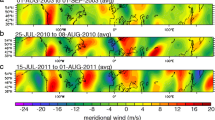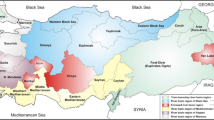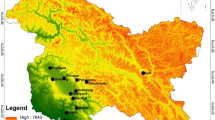Abstract
Temperature extremes in Toronto, Ontario, Canada are examined using an under-utilized approach. The frequency of temperature extreme records per year is examined for the period of 1971 to 2000. Consistent with other published metrics, record extreme cold temperatures is decreasing at five weather observing stations in the Greater Toronto Area. This was confirmed using three different statistical tests indicating the change signal was stronger for weather stations on the fringe of the urban area suggesting that expanding urbanization was a major factor in this net change. However, this was not found to be the case for record extreme warm temperatures where increasing trends were not statistically significant. The effects of the Mt. Pinatubo eruption in 1991 were detected in both the minimum and maximum temperatures records.



Similar content being viewed by others
References
Bassett GW Jr (1992) Breaking recent global temperature records. Clim Chang 21(3):303–315
Benestad RE (2004) Record-values, nonstationarity tests and extreme value distributions. Glob Planet Chang 44:11–26
Bolboaca S-D, Jantschi L (2006) Pearson versus Spearman, Kendall’s tau correlation analysis on structure activity relationships of biologic compounds. Leonardo J Sci 9:179–200
Bonsal BR, Zhang X, Vincent LA, Hogg WD (2001) Characteristics of daily and extreme temperatures over Canada. J Clim 14:1959–1976
Coumou D, Rahmstorf S (2012) A decade of weather extremes. Nat Clim Chang 2:491–496
Easterling DR, Evans JL, Groisman PY, Karl TR, Kunkel KE, Ambenje P (2000a) Observed variability and trends in extreme climate events: a brief review. Bull Am Meteorol Soc 81(3):417–425
Easterling DR, Meehl GA, Parmesan C, Changnon SA, Karl TR, Mearns LO (2000b) Climate extremes: observations, modeling, and impacts. Science 289:2068–2074
Frich P, Alexander LV, Della-Marta P, Gleason B, Haylock M, Klein Tank AMG, Peterson T (2002) Observed coherent changes in climatic extremes during the second half of the twentieth century. Clim Res 19:193–212
Gough WA (2008) Theoretical considerations of a day-to-day temperature variability applied to Toronto and Calgary, Canada data. Theor Appl Climatol 94:97–105
Gough WA, Rosanov Y (2001) Aspects of Toronto’s climate: heat island and lake breeze. Can Meteorol Oceanogr Soc Bull 29:67–71
Gough WA, Lillyman CD, Karagtzide J, Tsuji LJS (2002) Determining the validity of using summer monitoring to estimate annual deposition of acidic pollutants in Southern Ontario, Canada. Water Air Soil Pollut 137:305–316
Gu G, Adler RF (2011) Precipitation and temperature variations on the interannual time scale: assessing the impact of ENSO and volcanic eruptions. J Clim 24(9):2258–2270
Helsel DR, Hirsch RM (1992) Statistical methods in water resources. Elsevier Science Publishers, USA
Hirsch RM, Slack JR, Smith RA (1982) Techniques of trend analysis for monthly water quality data. Water Resour Res 18:107–121
Hoyt DV (1981) Weather 'records' and climatic change. Clim Chang 3(3):243–249
Lelasseux S (2005) A historical and experimental study of the urban heat island in Toronto. Master’s thesis. Department of Geography, University of Toronto. 98 pp
Meehl GA, Tebaldi C, Walton G, Easterling D, McDaniel L (2009) Relative increase of record high maximum temperatures compared to record low minimum temperatures in the U.S. Geophys Res Lett 36(23), L23701
Mohsin T, Gough WA (2010) Trend analysis of long-term temperature time series in the Greater Toronto Area (GTA). Theor Appl Climatol 101:311–327
Mohsin T, Gough WA (2012) Characterization and estimation of urban heat island at Toronto: impact of the choice of rural sites. Theor Appl Climatol 108(1–2):105–117
Mohsin T, Gough WA (2013) Impact of climate change on the extremes of observed daily temperature data in the Greater Toronto Area. Climate Research (submitted)
Newman WI, Malamud BD, Turcotte DL (2010) Statistical properties of record-breaking temperatures. Phys Rev E Stat Nonlinear Soft Matter Phys 82(6):066111
Redner S, Petersen MR (2006) Role of global warming on the statistics of record-breaking temperatures. Phys Rev E Stat Nonlinear Soft Matter Phys 74:6
Rowe CM, Derry LE (2012) Trends in record-breaking temperatures for the conterminous United States. Geophys Res Lett 39(16), L16703
Sen PK (1968) Estimates of the regression coefficient based on Kendall’s tau. J Am Stat Assoc 63:1379–1389
Tam B, Gough WA (2012) Examining past temperature variability in Moosonee, Thunder Bay and Toronto, Ontario, Canada through a day-to-day variability framework. Theor Appl Climatol 110:103–113
Trenberth KE, Jones PD, Ambenje P, Bojariu R, Easterling D, Klein Tank A, Parker D, Rahimzadeh F, Renwick JA, Rusticucci M, Soden B, Zhai P (2007) Observations: surface and atmospheric climate change. In: Solomon SD, Qin M, Manning Z, Chen M, Marquis KB, Averyt M, Tignor H, Miller L (eds) Climate Change 2007: The Physical Science Basis. Contribution of Working Group I to the Fourth Assessment Report of the Intergovernmental Panel on Climate Change. Cambridge University Press, Cambridge, pp 235–336
Vincent LA, Mekis E (2006) Changes in daily and extreme temperature and precipitation indices for Canada over the twentieth century. Atmos–Ocean 44(2):177–193
Vincent LA, Peterson TC, Barros VR, Marino MB, Rusticucci M, Carrasco G, Ramirez E, Alves LM, Ambrizzi T, Berlato MA, Grimm AM, Marengo JA, Molion L, Moncunill DF, Rebello E, Anunciacao YMT, Quintana J, Santos JL, Baez J, Coronel G, Garcia J, Trebejo I, Bidegain M, Haylock MR, Karoly D (2005) Observed trends in indices of daily temperature extremes in South America 1960–2000. J Clim 18:5011–5023
Vincent LA, Wang XL, Milewska EJ, Hui W, Yang F, Swail V (2012) A second generation of homogenized Canadian monthly surface air for climate trend analysis. J Geophys Res 117, D18110. doi:10.1029/2012JD017859
Wergen G, Krug J (2010) Recording-breaking temperatures reveal a warming climate. Europhys Lett 92(3), doi: 10.1209/0295-5075/92/30008
Author information
Authors and Affiliations
Corresponding author
Rights and permissions
About this article
Cite this article
Allen, S.M.J., Gough, W.A. & Mohsin, T. Changes in the frequency of extreme temperature records for Toronto, Ontario, Canada. Theor Appl Climatol 119, 481–491 (2015). https://doi.org/10.1007/s00704-014-1131-1
Received:
Accepted:
Published:
Issue Date:
DOI: https://doi.org/10.1007/s00704-014-1131-1




